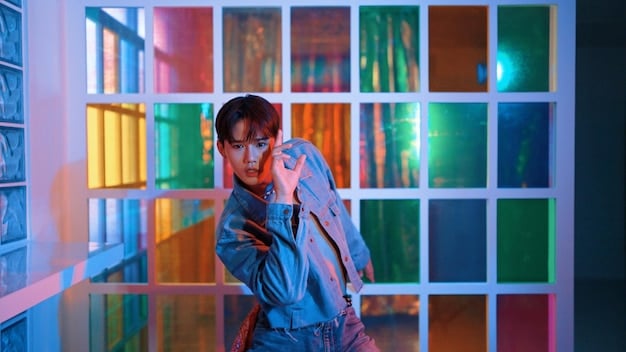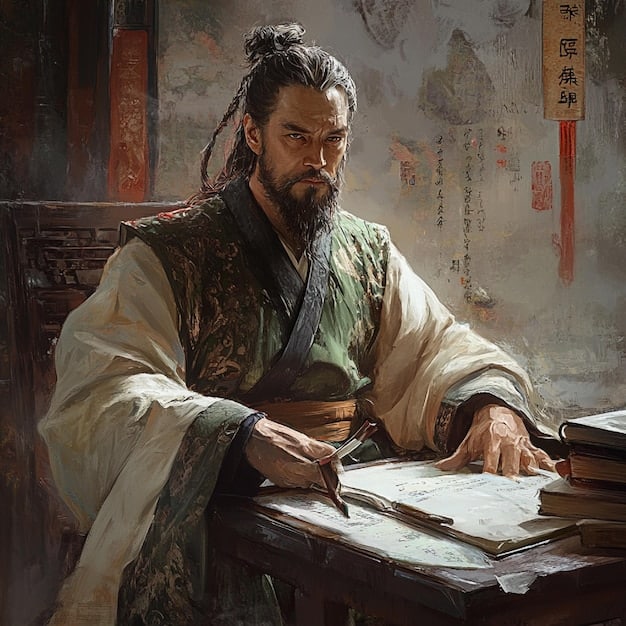Confucianism in K-Dramas: A 2025 Analysis of Traditional Values

The Influence of Confucianism: Examining Traditional Values in Modern K-Dramas (2025 Analysis) reveals how deeply rooted Confucian principles continue to shape character behaviors, plot structures, and thematic elements in contemporary Korean television, reflecting both enduring social norms and evolving cultural interpretations.
Delve into the captivating world of K-dramas and discover how ancient Confucian values still resonate in modern storytelling, with our deep dive into The Influence of Confucianism: Examining Traditional Values in Modern K-Dramas (2025 Analysis).
The Enduring Legacy of Confucianism in K-Dramas
Confucianism, an ancient philosophy and ethical system, has profoundly shaped Korean culture and society for centuries. Its core tenets, which emphasize filial piety, respect for elders, harmony, and social hierarchy, continue to influence various aspects of Korean life, including its popular entertainment. K-dramas, with their global appeal, serve as a fascinating medium to explore how these traditional values are portrayed and reinterpreted in contemporary contexts.
Understanding the influence of Confucianism in K-dramas provides valuable insights into the cultural nuances and social dynamics that underpin these narratives. By examining how these values are presented, challenged, and adapted, we can gain a deeper appreciation for the complexities of Korean society and its ongoing negotiation between tradition and modernity.

In this analysis, we will explore specific examples of K-dramas from 2025 that showcase the influence of Confucianism. These dramas will be analyzed to reveal how they reflect or challenge these traditional values, offering a lens through which we can understand the evolving cultural landscape of South Korea.
The Core Principles of Confucianism
To fully grasp the influence of Confucianism in K-dramas, it’s essential to understand its core principles. These principles form the foundation of Korean social ethics and provide a framework for understanding interpersonal relationships and social obligations.
- Filial Piety (Hyo): This is the cornerstone of Confucianism, emphasizing respect, obedience, and care for one’s parents and ancestors.
- Benevolence (Ren): This principle underscores the importance of humaneness, empathy, and acting with kindness towards others.
- Righteousness (Yi): This refers to moral uprightness and doing what is right, just, and ethical in all situations.
- Propriety (Li): This involves adhering to social norms, rituals, and etiquette to maintain harmony and order in society.
- Wisdom (Zhi): This emphasizes the pursuit of knowledge, self-cultivation, and moral understanding.
These principles are not merely abstract concepts; they are deeply ingrained in the fabric of Korean society and are often reflected in the characters, relationships, and narratives of K-dramas. Throughout the article, we’ll be taking a look at a few of these, highlighting their impact on modern drama.
Filial Piety and Family Dynamics in K-Dramas
Filial piety, or hyo, is perhaps the most prominent Confucian value depicted in K-dramas. It encompasses a deep respect, obedience, and devotion to one’s parents and ancestors. Family dynamics, often shaped by this principle, serve as a central theme in many dramas.
The portrayal of filial piety in K-dramas often involves characters making significant sacrifices for their parents’ well-being, enduring hardships to fulfill their obligations, and navigating complex family relationships. These narratives provide viewers with a glimpse into the cultural expectations and the emotional complexities associated with honoring one’s family.
Sacrifice and Obligation
Many K-dramas feature characters who prioritize their parents’ needs over their own desires, showcasing the sacrificial aspect of filial piety. This can involve making career choices, entering into arranged marriages, or taking on financial burdens to support their families. Shows demonstrating this as of 2025 include:
- “Family Ties”: A drama where the main character postpones their dreams of becoming a musician to care for their ailing mother.
- “The Eldest Daughter”: This show follows a young woman who takes on the responsibility of raising her siblings after her parents pass away.
Conflict and Reconciliation
While filial piety is often presented positively, K-dramas also explore the conflicts that can arise when individual desires clash with filial obligations. K-dramas often explore:
- Generational Differences: Stories featuring clashes between traditional parents and their more modern-minded children.
- The Burden of Expectations: Portrayals of characters struggling under the weight of their family’s expectations.
- The Importance of Communication: Shows emphasizing the need for open dialogue and understanding within families to resolve conflicts.
Ultimately, K-dramas often portray the importance of finding a balance between honoring one’s filial duties and pursuing personal happiness. These narratives encourage viewers to reflect on their own relationships with their families and to consider the complexities of navigating traditional values in a rapidly changing world.
Hierarchy and Social Status in K-Drama Plots
Confucianism emphasizes social hierarchy and the importance of maintaining order and respect within society. This is reflected in K-dramas through portrayals of social status, power dynamics, and the observance of proper etiquette.
The hierarchical structure of Korean society, influenced by Confucian principles, is often evident in workplace dramas, historical dramas, and even romantic comedies. Characters’ interactions are frequently shaped by their relative positions in the social hierarchy, and the observance of proper etiquette is crucial for maintaining harmony and avoiding social faux pas.

Workplace Dynamics
Workplace dramas often provide a fertile ground for exploring Confucian-inspired hierarchy. These stories typically depict:
- Seniority and Respect: Shows emphasizing the importance of respecting one’s superiors and following their instructions.
- The Importance of Teamwork: Portrayals of how collaboration and cooperation within a hierarchical structure can lead to success.
- Challenges to Authority: Narratives that explore the tensions between respecting authority and challenging unfair or unethical practices.
Power and Influence
K-dramas frequently depict the influence of wealth, social standing, and political power on individuals’ lives and relationships. Classic representations include:
- “The Elite Circle”: A drama about the lives of wealthy families and the power they wield within society.
- “Political Intrigue”: This show explores the complex power dynamics within the government and the lengths people will go to in order to achieve their ambitions.
By examining the portrayal of hierarchy and social status in K-dramas, viewers gain a deeper understanding of the social complexities that shape Korean society. These narratives often prompt viewers to consider the balance between respecting tradition and challenging social inequalities.
The Role of Propriety (Li) in Character Interactions
Li, or propriety, refers to the set of social norms, rituals, and etiquette that govern interpersonal interactions in Confucianism. Adhering to these norms is seen as essential for maintaining social harmony and demonstrating respect for others. K-dramas frequently showcase the importance of li through characters’ behaviors and interactions.
From formal greetings and bowing to gift-giving customs and dining etiquette, K-dramas provide a rich tapestry of examples showcasing the nuances of Korean propriety. These depictions offer viewers insights into the unspoken rules that govern social interactions and the potential consequences of violating them.
Rituals and Etiquette
K-dramas often feature scenes that highlight the importance of specific rituals and etiquette in various social settings. Scenarios include:
- Formal Greetings: Demonstrations of the proper way to bow and address individuals based on their age and social status.
- Dining Etiquette: Portrayals of the rules and customs associated with sharing meals, such as waiting for elders to begin eating and using utensils properly.
Consequences of Impropriety
K-dramas also explore the consequences that can arise when characters violate social norms or display a lack of propriety. These situations may include:
- Social Ostracism: Portrayals of characters being excluded or shunned for their inappropriate behavior.
- Misunderstandings and Conflicts: Narratives outlining how a lack of propriety can lead to misunderstandings, hurt feelings, and conflicts between individuals.
By showcasing the importance of propriety in character interactions, K-dramas reinforce the cultural values that prioritize harmony, respect, and social order. These depictions invite viewers to reflect on their own behaviors and to consider the impact of their actions on others.
Confucianism and the Portrayal of Gender Roles
Confucianism has historically influenced gender roles in Korean society, with traditional teachings emphasizing the importance of women’s roles within the family and their subordination to men. While modern K-dramas have made significant strides in challenging these traditional norms, the influence of Confucianism on the portrayal of gender roles remains evident.
In many older K-dramas, female characters were often depicted as demure, obedient, and primarily focused on domestic duties. However, contemporary dramas are increasingly featuring strong, independent female leads who challenge societal expectations and pursue their own ambitions. While change is occuring, traditional portrayals continue to show in newer shows, as well.
Traditional Gender Roles
Despite the evolving landscape, some K-dramas continue to perpetuate traditional gender roles to some extent. These productions may include:
- The Submissive Wife: Portrayals of women who prioritize their husbands’ needs and defer to their decisions.
- The Dedicated Mother: Depictions of women who dedicate their lives to raising their children.
Challenging Gender Norms
Many modern K-dramas are actively challenging traditional gender roles and presenting more empowering portrayals of women. This happens by:
- Independent Female Leads: Shows featuring women who are successful in their careers, assertive in their relationships, and unafraid to challenge societal expectations.
- Male Allies: Depictions of men who support women’s empowerment and challenge traditional gender stereotypes.
By examining the portrayal of gender roles in K-dramas, viewers can gain insights into the ongoing dialogue surrounding gender equality in Korean society. These representations invite viewers to question traditional norms and to consider the possibilities for a more equitable and inclusive future.
The Balance Between Tradition and Modernity
One of the most compelling aspects of K-dramas is their ability to explore the complex relationship between tradition and modernity in Korean society. Confucian values, while deeply ingrained in Korean culture, are constantly being reinterpreted and adapted to fit the changing needs and aspirations of a modern world.
K-dramas often depict characters grappling with the tension between upholding traditional values and embracing new ideas and lifestyles. These narratives provide a platform for exploring the challenges and opportunities that arise when tradition and modernity collide.
Embracing Change
Many K-dramas showcase how Korean society is adapting to globalization, technological advancements, and changing social norms. Shows might do this by:
- Intercultural Relationships: Portrayals of couples from different cultural backgrounds navigating their relationships and bridging cultural divides.
- Technological Advancements: Depictions of how technology is transforming various aspects of Korean life, from communication and entertainment to education and business.
Preserving Cultural Heritage
While embracing change, K-dramas also emphasize the importance of preserving Korean cultural heritage and traditions. They could convey messages as:
- Historical Dramas (“Sageuks”): Productions that celebrate Korean history, culture, and traditions.
- Contemporary Dramas with Traditional Elements: Shows that incorporate traditional music, dance, or art forms into their narratives.
By exploring the balance between tradition and modernity, K-dramas offer viewers a nuanced perspective on the complexities of Korean society. These representations invite viewers to consider how they can honor their cultural heritage while embracing the opportunities and challenges of a rapidly changing world.
Future Trends: Confucianism in 2025 K-Dramas
Looking ahead to 2025, it is likely that K-dramas will continue to explore the influence of Confucianism on Korean society, while also reflecting the evolving cultural landscape. Several trends can be anticipated in the portrayal of Confucian values in future dramas.
With the increasing globalization and interconnectedness of the world, K-dramas are likely to feature more diverse characters and storylines, reflecting the multicultural nature of modern Korean society. Furthermore, dramas may delve deeper into the complexities and contradictions within Confucian values, exploring the challenges and tensions that arise when these principles are applied in contemporary contexts.
Greater Diversity and Inclusion
Future K-dramas are expected to feature more diverse casts and storylines, showcasing the experiences of individuals from various ethnic, cultural, and socioeconomic backgrounds. This increased diversity may include:
- Multicultural Families: Portrayals of families with members from different cultural backgrounds, highlighting the challenges and rewards of intermarriage and raising bicultural children.
- LGBTQ+ Characters: More prominent and nuanced representations of LGBTQ+ individuals and their experiences in Korean society.
Challenging Traditional Norms
Future K-dramas may become even more critical of traditional norms and expectations, particularly in areas such as gender roles, social hierarchy, and filial piety. This could involve:
- Dismantling the Patriarchy: Stories critiquing traditional patriarchal structures and highlighting the struggles of women to overcome systemic discrimination.
- Questioning Authority: Narratives that challenge the unquestioning acceptance of authority and encourage critical thinking and dissent.
Overall, the future of Confucianism in K-dramas promises to be dynamic and engaging, reflecting the ongoing evolution of Korean society. These dramas will continue to serve as a valuable platform for exploring cultural values, challenging social norms, and promoting dialogue and understanding among diverse audiences.
| Key Point | Brief Description |
|---|---|
| 👨👩👧👦 Filial Piety | Respect, obedience, and care for parents and ancestors influence family dynamics. |
| 🏢 Social Hierarchy | Workplace interactions and power dynamics reflect Confucian principles of order. |
| 🤝 Propriety (Li) | Social norms and etiquette emphasize harmony and respect in character interactions. |
| 🎭 Gender Roles | Traditional roles are being challenged, with more independent female leads emerging. |
Frequently Asked Questions
▼
Filial piety often drives the plot, with characters making major life decisions to honor their parents’ wishes, showcasing the depth of familial obligation.
▼
Workplace dramas frequently depict junior employees respecting seniors, highlighting Confucian values in professional settings and illustrating the importance of respect in these settings.
▼
Yes, adhering to social norms dictates how characters behave, emphasizing politeness and respect to maintain social harmony, thus influencing how a character acts.
▼
Modern K-dramas increasingly feature strong, independent female leads, challenging the traditional submissive roles and portraying females in new ways.
▼
Dramas often explore characters navigating the tension between upholding Confucian values and embracing new lifestyles, showcasing society’s evolution. As culture changes, so do the stories.
Conclusion
The influence of Confucianism in K-dramas continues to provide a compelling lens through which to examine Korean culture and society. From filial piety and social hierarchy to propriety and gender roles, Confucian values shape the narratives, characters, and themes of these popular dramas, offering insights into the evolving relationship between tradition and modernity.





